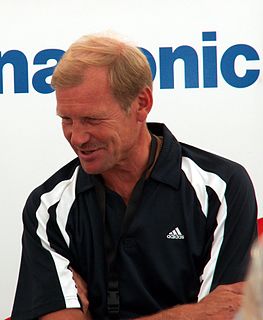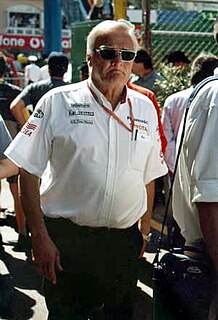
The Toyota Celica is an automobile produced by Toyota from 1970 until 2006. The Celica name derives from the Latin word coelica meaning 'heavenly' or 'celestial'. In Japan, the Celica was exclusive to the Toyota Corolla Store dealer chain.

Carlos Sainz Cenamor is a Spanish rally driver. He won the World Rally Championship drivers' title with Toyota in 1990 and 1992, and finished runner-up four times. Constructors' world champions to have benefited from Sainz are Subaru (1995), Toyota (1999) and Citroën. In the 2018 season he was one of the official drivers of the Team Peugeot Total. He received the Princess of Asturias Sports Award in 2020. Sainz is currently competing in Extreme E for the Acciona | Sainz XE Team alongside teammate Laia Sanz.

Juha Matti Pellervo Kankkunen is a Finnish former rally driver. His factory team career in the World Rally Championship lasted from 1983 to 2002. He won 23 world rallies and four drivers' world championship titles, which were both once records in the series. Both Sébastien Loeb and Sébastien Ogier have since collected more world titles, but no driver was able to repeat Kankkunen's feat of becoming a world champion with three different manufacturers until Ogier matched this achievement in 2020.

Tommi Antero Mäkinen is a Finnish racing executive and former driver.

The Ford Focus RS WRC is a car built for the Ford World Rally Team by Ford Europe and M-Sport and based on the Ford Focus Climate 2-litre production hatchback, developed to compete in the World Rally Championship. The RS stands for Rallye Sport and the WRC for World Rally Car, the car's FIA specification. The Focus RS WRC was in competition from 1999 to 2010, winning 44 world rallies and two manufacturers' world titles. It was replaced by the Ford Fiesta RS WRC.

Didier Auriol is a French former rally driver. Born in Montpellier, and initially an ambulance driver, he competed in the World Rally Championship throughout the 1990s. He became World Rally Champion in 1994, the first driver from his country to do so. He was a factory candidate for Lancia, Toyota and Peugeot among others, before losing his seat at Škoda at the end of 2003. His sister Nadine was also involved in rallying as a co-driver, while his brother Gerrard was also a former rally driver.
Ralliart is the high-performance and motorsports division of Mitsubishi Motors. It was responsible for development and preparation of the company's rally racing and off-road racing vehicles, as well as the development of high-performance models and parts available to the public. Ralliart scaled down its business activities in April 2010, though the brand will continue to be used by Mitsubishi.
Toyota Gazoo Racing Europe GmbH (TGR-E), formerly Andersson Motorsport GmbH and Toyota Motorsport GmbH (TMG), is a fully-owned and controlled entity of Toyota Motor Corporation, based in Cologne, Germany, which provides motorsport and automotive services to fellow Toyota companies and to outside clients, employing around 350 people in a 30,000 m2 factory.
The 1994 World Rally Championship was the 22nd season of the FIA World Rally Championship. The season consisted of 10 rallies. The drivers' world championship was won by Didier Auriol in a Toyota Celica Turbo 4WD, ahead of Carlos Sainz and Juha Kankkunen. The manufacturers' title was won by Toyota, ahead of Subaru and Ford.

Ove Andersson, nicknamed Påven, was a Swedish rally driver and the first head of Toyota's F1 programme.

The Toyota Celica GT-Four is a high performance model of the Celica Liftback that was produced from 1986 to 1999, with a turbocharged 3S-GTE engine, and full-time AWD. It was created to compete in the World Rally Championship, whose regulations dictate that a manufacturer must build road-going versions of the vehicle in sufficient numbers. These vehicles are referred to as "homologation special vehicles".
The 1989 World Rally Championship was the 17th season of the Fédération Internationale de l'Automobile (FIA) World Rally Championship (WRC). The season consisted of 13 rallies, with some adjustments to the schedule versus the previous season. The WRC ended its participation in North America by removing the Olympus Rally from the schedule, implementing in its place Rally Australia. An anomaly in the schedule was that 1989 was the only year in which the Swedish Rally and the Rallye de Monte Carlo were switched in place, with the Swedish event taking place to start the year. This made it the second and last time that Monte Carlo would not mark the first event of the WRC season until the 2009 season.

The Ford World Rally Team, also known as the Ford Motor Co. Team prior to 2005, is Ford Motor Company's full factory World Rally Championship team. In its current form, it has been a competitor since the 1997 season, when Ford Motor Company's motorsport arm selected the Malcolm Wilson Motorsport company to run its factory team, entering the Ford Escort World Rally Car. The new team took their first victory in the 1997 Acropolis Rally.

The Ford Escort RS Cosworth is a rally version homologation special of the fifth generation European Ford Escort. It was designed to qualify as a Group A car for the World Rally Championship, in which it competed between 1993 and 1998. It was available as a road car from 1992 until 1996 in very limited numbers. The first 2500 cars made before 1 January 1993 are in fact "Homologation special versions." It was instantly recognisable due to its large "whale tail" rear spoiler. One of the main selling points was the Cosworth YBT, a highly tunable turbocharged 2.0 L (1,993 cc) with a bore x stroke of 90.8 mm × 77 mm Inline-four engine which had an output of 227 PS in standard trim. Tuning companies have achieved power outputs of over 1,000 bhp.
Since its introduction to motorsport in the early 1970s, Toyota has been involved in a number of motorsport activities, most notably in Formula One, NASCAR, IndyCar, sports car racing, various off road rallies and the WRC. Currently, Toyota participates in the Toyota Racing Series, Super Formula, Formula Three, NHRA, USAC, Super GT, NASCAR, the WRC and the WEC.
Lars-Erik Torph was a Swedish rally driver. He debuted in the World Rally Championship in 1980 and took his first points at his home event, the Swedish Rally, in 1984. Driving a Toyota Celica TCT, a Toyota Supra 3.0i and an Audi Coupé Quattro, he went on to finish on the podium four times. After just turning 28, Torph and his co-driver Bertil-Rune Rehnfeldt died while spectating the 1989 Monte Carlo Rally, after Lancia driver Alex Fiorio lost control of his Delta Integrale and crashed into them.
Andrea Aghini Lombardi is an Italian rally driver. He won the 1992 Rallye Sanremo and took four other podium finishes in the World Rally Championship from 1992 to 1995. In 1992, he also won the Race of Champions, after beating Carlos Sainz in the semi-final and Colin McRae in the final.

The Lancia Delta Group A is a Group A rally car built for the Martini Lancia by Lancia to compete in the World Rally Championship. It is based upon the Lancia Delta road car and replaced the Lancia Delta S4. The car was introduced for the 1987 World Rally Championship season and dominated the World Rally Championship, scoring 46 WRC victories overall and winning the constructors' championship a record six times in a row from 1987 to 1992, in addition to drivers' championship titles for Juha Kankkunen and Miki Biasion, making Lancia the most successful marque in the history of the WRC and the Delta the most successful car.
Bernard Occelli is a former rally co-driver from France.
Toyota Gazoo Racing WRT is a World Rally Championship (WRC) team based in Finland that serves as Toyota's official factory team. Its team principal is former WRC driver Jari-Matti Latvala. The team made its début during the 2017 season, where it entered the Toyota Yaris WRC. The team is a separate entity from the Toyota Gazoo Racing team led by Toyota Motorsport GmbH that competes in the World Endurance Championship.












